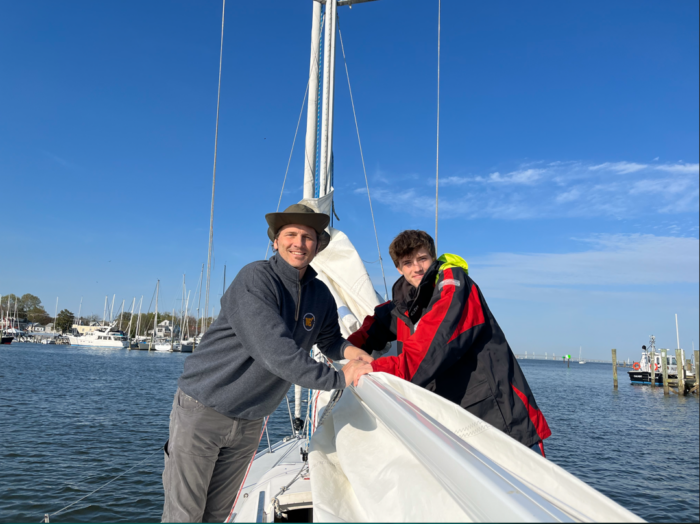
CHOW Chat: Stewart Sarkozy-Banoczy on Climate Resilience in Communities

Photo credit: Stewart Sarkozy-Banoczy
The Capitol Hill Ocean Week 2023 program will explore the ocean-climate connection and how we can make ocean conservation part of climate strategies and nationally determined contributions to address climate change. Stewart Sarkozy-Banoczy is a member of the 2023 CHOW Advisory Committee, Global Director of Policy and Investments at the Resilient Cities Network, an Ocean Fellow with the Center for Ocean Policy and Economics at the Northeast Maritime Institute, and Founder of Precovery Labs. We spoke with Stewart about his role on the Advisory Committee, his hopes for this year’s conference, and how investing in climate resilience benefits communities. Register today at CapitolHillOceanWeek.org!
What are you most looking forward to during Capitol Hill Ocean Week 2023?
I think we are at a crucial moment, both in terms of the shocks and stresses on the ocean, but also on the amount and types of funding that are coming. Being able to bring people to DC to hear from our amazing speakers line up, as well as those online, along with having in-person conversations at a time when we need to act, help underline how we plan and fund ocean-related solutions.
The theme of this year’s conference is Ocean X Climate. What is one thing you want to share (or that you wish more people knew) about how our ocean and our climate are connected?
The list is long for me when I consider what people need to know more about. From regulation of currents and global weather systems to carbon sequestration and the role of biodiversity and habitats on economy and environment. We live on a water planet and yet we are often, as individuals, communities and countries, completely disconnected from the ocean and its importance – not to mention its beauty and the healing power of the “blue mind” for everyone. The ocean effects everything in our climate systems and the more people feel the connection, the more adverse actions start to feel less like an “out of sight, out of mind” situation.
When you think of a climate resilient city – what does it look like?
A climate resilient city is one that considers all the potential shocks and stresses, including climate as a major chronic stress, and therefore brings all communities, peoples and systems into the equation with a holistic, equitable resilience lens that allows places not just to survive but to adapt and thrive. These cities and communities, large and small, especially in coastal areas – ocean, riverine and lacustrine – must have a future focused way of designing and planning, a precovery mindset.
How do we ensure that resilience centers equity and the voices of frontline and coastal communities most impacted by a changing climate?
I believe deeply, as do many of my colleagues and partners, that we cannot have resilience without equity. I would go even further and say that you cannot lead resilience with equity absent empathy. That means centering front line, coastal, low to moderate income, and already impacted communities from the beginning of stakeholder input through design and planning. And then we have to be sure that we are financing and funding the projects that have equity imbedded in resilience plans and projects.
How does investing in resilience today benefit local communities and help cities recover and thrive after climate-related disaster events in the future?
We have begun to speak of the “return on resilience value” and the quantification of the resilience characteristics and co-benefits, as a way of not just being better prepared for disasters, but for doing the recovery and precovery work at the same time. Preventative measures can help with recovery, but being on the recovery treadmill as we are now, is a position we need to step away from, so that we are investing in mitigation and adaption simultaneously, investing in urban systems and the ocean simultaneously. We are often stuck in funding and financing silos that do not take into account these holistic solutions and project implementation but we can do more of this with the ocean in mind.
How have you hoped to shape this year’s Capitol Hill Ocean Week through your role on the Advisory Committee?
Given that my work and passions have overlaps that include the ocean but I often see gaps between ocean practitioners and policy makers, I saw my role as trying to bring these parties together for the benefit of the ocean at a time where we see serious threats mounting. Weaving together climate adaptation and mitigation under a banner of equity, resilience and precovery, I see the topics, sessions and speakers being able to blend these efforts and join science with blue economy, blue tech, urban development, and island sustainability, to name just a few. And as much as I might hope to support and shape what Capitol Hill Ocean Week 2023 offers, I also enjoy the experience of the Advisory Committee and always learn from those around me.

Stewart Sarkozy-Banoczy at the 2018 March for the Ocean with Dr. Wallace Nichols. Photo credit: Susan Frick
